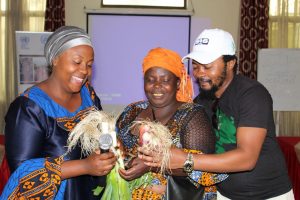During two days a training workshop was held with farmers and traders of agricultural products under the guidance of the NP UD.
UD.
Education on e-commerce and the use of agricultural information solutions such as agricultural weather, market prices and agricultural advice in the face of climate change was on the agenda.
On the first day, with only the farmers, we went around the problems they face; among which the problem of lack of market and climate change is a major challenge.
It was on the second day with the farmers and traders, that both sides told us about the problems. Traders report that potatoes and several vegetables are sold to buyers from Rwanda. This is how traders go to Rwanda to buy the same products. On that note, the worrying question is why Congolese traders do not buy agricultural products directly from Kibumba? Both parties had informed us of the different reasons behind this transit.
- From the merchants:
– In Kibumba, they often miss the desired quantity while in Rwanda, they find any quantity desired;
– Agricultural products are more expensive in Kibumba than in Rwanda;
– In Kibumba it is difficult to know who the real farmer is because of the many commercial intermediaries;
– Insecurity is higher in Kibumba than in Rwanda;
– Kibumba is farther than Gisenyi;
– the farmers of Kibumba prefer to sell to Rwandans instead of Congolese, etc.
- From the farmers:
– Lack of Congolese traders and some products rot quickly in the production areas;
– Not only are they not honest in business, but they also dictate the price;
– And they don’t care much about our social life.
– Congolese merchants don’t accept Kilogram scale indicators, and if they do, then they’ve rigged it. They prefer bag measurements, especially the one with a big hat that weighs about 180 to 190 kg.
In addition, farmers had given the reason why they trust traders from Rwanda:
- Rwandan traders buy up all production before the harvest
- They monitor the farms each time to identify the fields that will have good harvests;
- The price proposed by the Rwandan traders takes into account the production costs that the farmers undergo;
- In the case of credit sales, if a Congolese farmer goes to Rwanda to claim payment from a Rwandan trader, the Rwandan justice system will take the complaint of the Congolese farmers with more consideration. And the merchants risk 2 years in prison;
- A Rwandan trader is even willing to finance the production with the seed.
Following this session of exposure of the problems of both parties, comes the training on agricultural e-commerce and access to agricultural information such as agricultural weather, market price and agricultural advice through the application HewAgri for a resilient agriculture to climate change through the use of a cell phone.
The farmers had to enjoy explanations on how to use this application, and how to subscribe to be able to benefit from this solution and all its advantages. It was followed by a test session in the presence of everyone, and the results were immediately visible (sms on the weather, the market price, agricultural advice …). However, the farmers were satisfied with this solution from KivuGreen which was in their favor.
Despite the important contribution of HewAgri, both parties still made recommendations to the Congolese government that could help solve the above-mentioned problems:
- Regulation of the agricultural sector by establishing a unit of measurement that favors both parties, thus the sale in kg;
- Improved safety in production areas;
- Involvement of the Congolese justice system in an objective and impartial manner during the sales conflict;
- Establishment of an agricultural information system to help both parties know regularly the supply and demand of the market;
- Strengthening the dialogue between farmers and traders and
- Training in the business is an asset for both parties
In the end, this two-day training workshop ended with a moment of exchange and sharing of a cocktail around a table between the farmers and traders present at this training.
